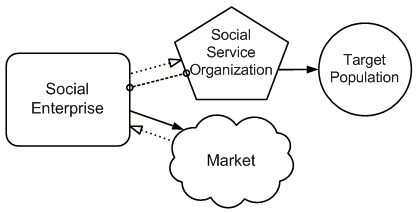 The organizational support model of social enterprise sells products and services to an external market, businesses or general public. In some cases the target population or "client" is the customer.
The organizational support model of social enterprise sells products and services to an external market, businesses or general public. In some cases the target population or "client" is the customer.
The organizational support model is usually external: Business activities are separate from social programs, net revenues from the social enterprise provide a funding stream to cover social program costs and operating expenses of the nonprofit parent organization. Although organizational support models may have social attributes, profit not social impact is the perquisite for this type of social enterprise. This model of social enterprise is created as a funding mechanism for the organization and is often structured as a subsidiary business (a nonprofit or for-profit entity) owned by the nonprofit parent. Successful examples of this model cover all or a major portion of the parent organization's budget.
Similar to service subsidization model, the organizational support model may implement virtually any type of business that leverages its assets. This model is commonplace among western nonprofit organizations across sectors.
Theoretical example: an environmental organization created a separate for-profit subsidiary that contracts with the government to conduct environmental monitoring and compliance evaluations of private companies. Profits after tax and business reinvestment are funneled to the nonprofit parent, an environmental education organization. This income represents a major source of unrestricted funding, allocated to the nonprofit's operating expenses as well as environmental advocacy programs for which the organization is unable to obtain donor funding.
Para la Salud, an example of Organizational Support Model
In many rural areas in Guatemala, residents lack access to basic health services, inputs, and medicines. Barriers include: mountainous topography with few roads, poor distribution systems for health inputs, urban flight of medical professionals, and few sources of stable funding for community clinics.
Para la Salud, a national health organization, started a chain of village pharmacies to address this problem. The pharmacy social enterprise was designed as a sustainable distribution model for health inputs in rural areas as well as a means to generate funds to subsidize rural clinics. Para la Salud purchasing is centralized, medicines and supplies are ordered in bulk and shipped to Para la Salud's headquarters in Guatemala City before being sent to rural pharmacies.
The organization has also worked hard to counter the effects of brand marketing by US pharmaceutical companies through educational campaigns that promote lower cost generic drugs. The business model uses streamlined systems, centralized purchasing, inventory management, order fulfillment, and delivery to lower the high transaction costs associated with serving rural areas.
The pharmacies have an average profit margin of 20% to 25%, and profits are used to cover the costs of rural community health clinics. To date, this village pharmacy social enterprise enables a community to self-fund its local clinic without external subsidy in four to five years. Currently, Para la Salud operates 43 village pharmacies serving poor communities in 13 departments in Guatemala.
